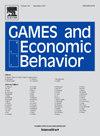Strategic mobilization of voters
IF 1
3区 经济学
Q3 ECONOMICS
引用次数: 0
Abstract
Organized public demonstrations of voter support for policy issues through rallies and petitions are mechanisms by which interest groups sometimes seek to influence political decision-making. We develop a voter-participation model of an interest group's strategic decision to publicly mobilize supportive voters through either a petition with zero participation cost or through a public rally with positive participation cost. Our model shows that voter mobilization can be influential when elected politicians are sufficiently uncertain about two dimensions of voters' preferences, the breadth of support for the issue and the saliency of the issue. The distribution of voter preferences – defined by the numbers of policy supporters and opposers and election vote-switchers and non-switchers – determines whether low or high participation-cost forms of mobilization are optimal. The model's predictions are consistent with recent mobilization campaigns organized by a range of interest groups, such as firms, environmental activists, and racial justice advocates.
策略性动员选民
通过集会和请愿有组织地公开展示选民对政策问题的支持,是利益集团有时试图影响政治决策的机制。我们建立了利益集团通过零参与成本的请愿或积极参与成本的公众集会公开动员支持性选民的战略决策的选民参与模型。我们的模型表明,当当选的政治家对选民的偏好、对问题的支持广度和问题的显著性这两个维度有足够的不确定性时,选民动员可能会产生影响。选民偏好的分布- -由政策支持者和反对者以及选举投票转换者和非转换者的人数- -决定了低或高参与成本的动员形式是最佳的。该模型的预测与最近一系列利益集团组织的动员运动是一致的,这些利益集团包括公司、环保活动人士和种族正义倡导者。
本文章由计算机程序翻译,如有差异,请以英文原文为准。
求助全文
约1分钟内获得全文
求助全文
来源期刊

Games and Economic Behavior
ECONOMICS-
CiteScore
1.90
自引率
9.10%
发文量
148
期刊介绍:
Games and Economic Behavior facilitates cross-fertilization between theories and applications of game theoretic reasoning. It consistently attracts the best quality and most creative papers in interdisciplinary studies within the social, biological, and mathematical sciences. Most readers recognize it as the leading journal in game theory. Research Areas Include: • Game theory • Economics • Political science • Biology • Computer science • Mathematics • Psychology
 求助内容:
求助内容: 应助结果提醒方式:
应助结果提醒方式:


